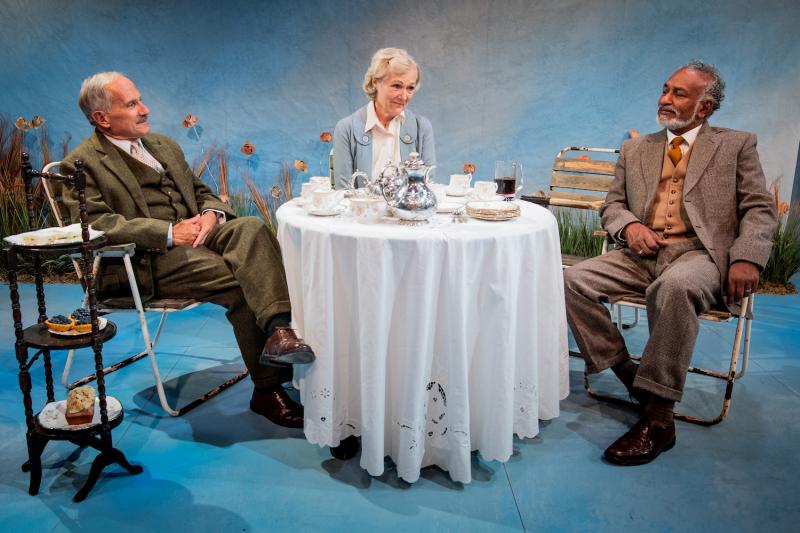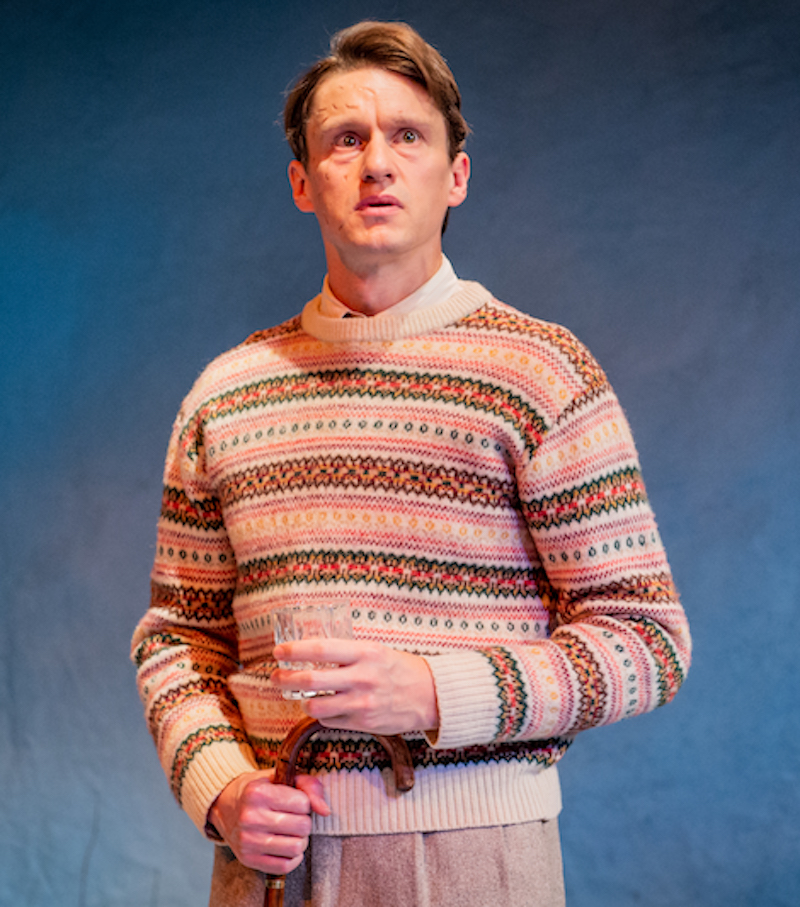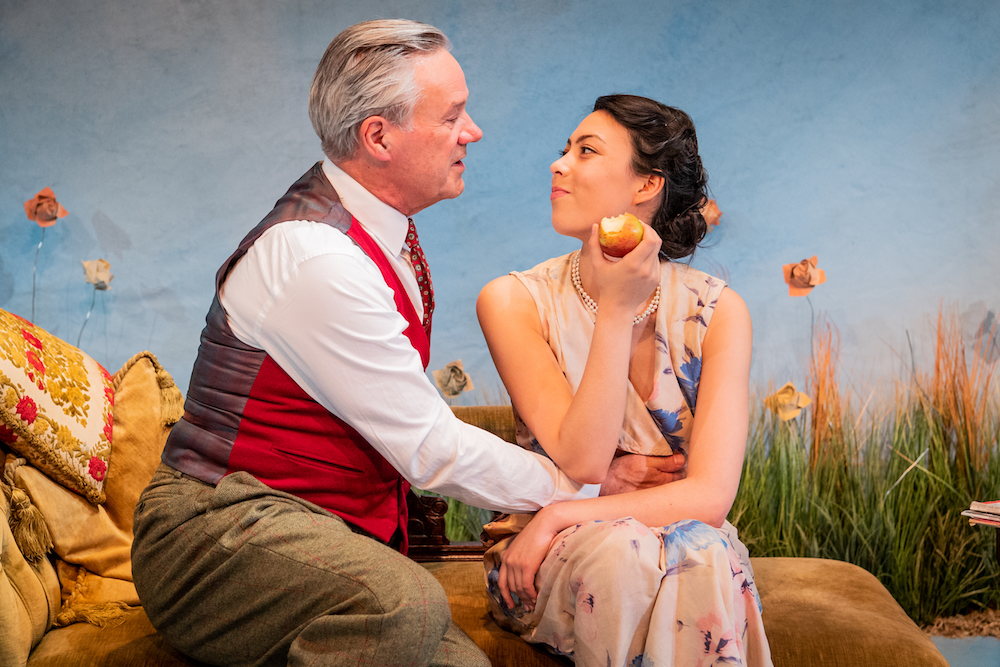For Services Rendered, Jermyn Street Theatre review – uneven revival of 1930s drama | reviews, news & interviews
For Services Rendered, Jermyn Street Theatre review – uneven revival of 1930s drama
For Services Rendered, Jermyn Street Theatre review – uneven revival of 1930s drama
A mixed bag of performances from a big cast in Somerset Maugham's anti-war play

“I don’t think I have the right to influence her,” says an older character of her daughter in For Services Rendered, W Somerset Maugham’s 1932 anti-war drama. If only all elder statesmen and women felt the same about the youth.
The setting is appropriately idyllic: a garden in rural Kent (the village’s name is Ramblestone, naturally), late summer 1932, the gentle thwocks of a game of tennis drifting over the fence. Eden complete with apples. Louie Whitemore’s set and Ali Hunter’s lighting work brilliantly together here to create this fragile softness. Both are Jermyn veterans, and it shows: at times the stage looks like a watercolour at dusk, at others it sharpens into striking backlit tableaux.
 At first glance, the Ardsley family have it pretty good: mum Charlotte (Diane Fletcher, perhaps best known for the original House of Cards) is pouring tea on the lawn while dad Leonard (an appropriately blasé Richard Derrington) gets on with business in his study, to which he tends to retreat in a rather Mr Bennet-esque fashion when things get awkward. Only son Sydney (Richard Keightley, pictured right, excellent) has been blinded by his time in the trenches, but his sister Eva (Rachel Pickup) cares for him with all the dutifulness of an eldest daughter. In fact, as Sydney remarks snidely (maybe the snarky blind person trope wasn’t quite so prevalent in the 1930s), she seems to actively enjoy sacrificing herself for her family.
At first glance, the Ardsley family have it pretty good: mum Charlotte (Diane Fletcher, perhaps best known for the original House of Cards) is pouring tea on the lawn while dad Leonard (an appropriately blasé Richard Derrington) gets on with business in his study, to which he tends to retreat in a rather Mr Bennet-esque fashion when things get awkward. Only son Sydney (Richard Keightley, pictured right, excellent) has been blinded by his time in the trenches, but his sister Eva (Rachel Pickup) cares for him with all the dutifulness of an eldest daughter. In fact, as Sydney remarks snidely (maybe the snarky blind person trope wasn’t quite so prevalent in the 1930s), she seems to actively enjoy sacrificing herself for her family.
Two more daughters complete the set: Ethel (Leah Whitaker), somewhat unhappily married to an alcoholic tenant farmer (Burt Caesar), and Lois (Sally Cheng, pitch-perfect), who is pursued by married businessman Wilfred Cedar (Michael Lumsden, pictured below with Cheng). Wilfred’s wife Gwen (Viss Elliott Safavi) is there too, as is ex-naval officer Collie Stratton (Jothan Annan), in dire financial straits after setting up a garage in the village. Jim Findley completes the line-up as Charlie Prentice, Charlotte’s brother and a doctor. Phew.
If you’re thinking that’s a lot of bodies for even a normal-sized theatre, you’ve hit upon a key problem. The play just has too many characters. Maugham does a good job of restricting scenes to two or three at a time, but it’s still hard to keep track of them all, especially in the first act. (Praise due to costume designer Emily Stuart for doing her best to separate them in lovely period dresses, jumpsuits and waistcoats.) The rhythms are off, which is frustrating, as the second half is a good deal sharper. Fletcher especially comes into her own, displaying hidden fragility under a balm of reassuring well-meaning-ness. The original run at the Globe (now Gielgud) Theatre in winter 1932 was only 78 performances – audiences weren’t on-board with its anti-war message. There are other reasons to take issue with it, even if you're a staunch pacifist: Eva’s breakdown is at once predictable and hardly prefigured at all, reminiscent of a certain female character's ‘madness’ in the final season of Game of Thrones. Sydney is so clearly the writer’s favourite that it seems unfair to the other characters that he and his mother get all the best lines. And Gwen’s picture of Wilfred as a charismatic seducer doesn’t really ring true.
The original run at the Globe (now Gielgud) Theatre in winter 1932 was only 78 performances – audiences weren’t on-board with its anti-war message. There are other reasons to take issue with it, even if you're a staunch pacifist: Eva’s breakdown is at once predictable and hardly prefigured at all, reminiscent of a certain female character's ‘madness’ in the final season of Game of Thrones. Sydney is so clearly the writer’s favourite that it seems unfair to the other characters that he and his mother get all the best lines. And Gwen’s picture of Wilfred as a charismatic seducer doesn’t really ring true.
It’s difficult to see why Littler chose to revive this piece. Sydney’s furious monologue denouncing the politicians and generals who sent ordinary people to die holds some relevance for today, as does Maugham’s depiction of how we treat veterans when they come home. But other than that, and some sorely needed diversity, there's little to link it to 2019.
Aoife Kennan is making her professional debut in the smallest role: Gertrude, the Ardsleys’ long-suffering maid. I couldn’t help but wish that the whole thing had been about her.
rating
Explore topics
Share this article
The future of Arts Journalism
You can stop theartsdesk.com closing!
We urgently need financing to survive. Our fundraising drive has thus far raised £49,000 but we need to reach £100,000 or we will be forced to close. Please contribute here: https://gofund.me/c3f6033d
And if you can forward this information to anyone who might assist, we’d be grateful.

Subscribe to theartsdesk.com
Thank you for continuing to read our work on theartsdesk.com. For unlimited access to every article in its entirety, including our archive of more than 15,000 pieces, we're asking for £5 per month or £40 per year. We feel it's a very good deal, and hope you do too.
To take a subscription now simply click here.
And if you're looking for that extra gift for a friend or family member, why not treat them to a theartsdesk.com gift subscription?
more Theatre
 Little Brother, Soho Theatre review - light, bright but emotionally true
This Verity Bargate Award-winning dramedy is entertaining as well as thought provoking
Little Brother, Soho Theatre review - light, bright but emotionally true
This Verity Bargate Award-winning dramedy is entertaining as well as thought provoking
 The Unbelievers, Royal Court Theatre - grimly compelling, powerfully performed
Nick Payne's new play is amongst his best
The Unbelievers, Royal Court Theatre - grimly compelling, powerfully performed
Nick Payne's new play is amongst his best
 The Maids, Donmar Warehouse review - vibrant cast lost in a spectacular-looking fever dream
Kip Williams revises Genet, with little gained in the update except eye-popping visuals
The Maids, Donmar Warehouse review - vibrant cast lost in a spectacular-looking fever dream
Kip Williams revises Genet, with little gained in the update except eye-popping visuals
 Ragdoll, Jermyn Street Theatre review - compelling and emotionally truthful
Katherine Moar returns with a Patty Hearst-inspired follow up to her debut hit 'Farm Hall'
Ragdoll, Jermyn Street Theatre review - compelling and emotionally truthful
Katherine Moar returns with a Patty Hearst-inspired follow up to her debut hit 'Farm Hall'
 Troilus and Cressida, Globe Theatre review - a 'problem play' with added problems
Raucous and carnivalesque, but also ugly and incomprehensible
Troilus and Cressida, Globe Theatre review - a 'problem play' with added problems
Raucous and carnivalesque, but also ugly and incomprehensible
 Clarkston, Trafalgar Theatre review - two lads on a road to nowhere
Netflix star, Joe Locke, is the selling point of a production that needs one
Clarkston, Trafalgar Theatre review - two lads on a road to nowhere
Netflix star, Joe Locke, is the selling point of a production that needs one
 Ghost Stories, Peacock Theatre review - spirited staging but short on scares
Impressive spectacle saves an ageing show in an unsuitable venue
Ghost Stories, Peacock Theatre review - spirited staging but short on scares
Impressive spectacle saves an ageing show in an unsuitable venue
 Hamlet, National Theatre review - turning tragedy to comedy is no joke
Hiran Abeyeskera’s childlike prince falls flat in a mixed production
Hamlet, National Theatre review - turning tragedy to comedy is no joke
Hiran Abeyeskera’s childlike prince falls flat in a mixed production
 Rohtko, Barbican review - postmodern meditation on fake and authentic art is less than the sum of its parts
Łukasz Twarkowski's production dazzles without illuminating
Rohtko, Barbican review - postmodern meditation on fake and authentic art is less than the sum of its parts
Łukasz Twarkowski's production dazzles without illuminating
 Lee, Park Theatre review - Lee Krasner looks back on her life as an artist
Informative and interesting, the play's format limits its potential
Lee, Park Theatre review - Lee Krasner looks back on her life as an artist
Informative and interesting, the play's format limits its potential
 Measure for Measure, RSC, Stratford review - 'problem play' has no problem with relevance
Shakespeare, in this adaptation, is at his most perceptive
Measure for Measure, RSC, Stratford review - 'problem play' has no problem with relevance
Shakespeare, in this adaptation, is at his most perceptive
 The Importance of Being Earnest, Noël Coward Theatre review - dazzling and delightful queer fest
West End transfer of National Theatre hit stars Stephen Fry and Olly Alexander
The Importance of Being Earnest, Noël Coward Theatre review - dazzling and delightful queer fest
West End transfer of National Theatre hit stars Stephen Fry and Olly Alexander

Add comment